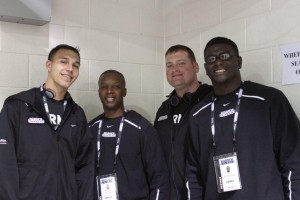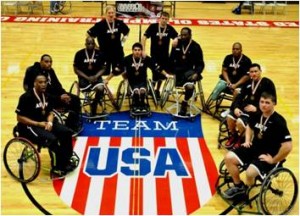By Tom Sileo, USO Director of Story Development
Editor’s Note: The USO is a participant in the AW2 Community Support Network.
If you take a stroll around the U.S. Olympic Training Center in Colorado Springs, CO, this week, the first thing you would notice is the sacrifice in your midst.
It’s hard to describe the emotion that overtakes every bone in your body when your eyes meet those of a fellow American who has sustained visible or invisible wounds while protecting our freedom. These men and women have already fought so hard for our nation, yet show the same courageous spirit while competing against one another in seven different sports.
The second thing you might notice, perhaps, is the presence of the USO at this joint U.S. Department of Defense / U.S. Olympic Committee event. While one might initially wonder what role the USO plays here, one might be wise to let Army Wounded Warrior Program (AW2) Director COL Greg Gadson explain the meaning of the USO logo and the friendly face that always accompanies it.
“What really impresses me about the USO and their support of the men and women of the wounded warrior programs and events that go on throughout the country is that they’re always in the background,” Gadson said Thursday. “That says a lot, I think, about their organization.”
What Gadson thinks says a lot, as very few Americans have sacrificed more to give us all the right to think freely. In 2007, both of Col. Gadson’s legs were amputated above the knee after being struck by an improvised explosive device in Iraq. Instead of retreating, he charged forward, devoting himself to fellow wounded warriors facing similar challenges, no matter how daunting. For the colonel, the Warrior Games is an annual culmination of the noble efforts of so many, as well as a part of his own healing process.
“To me, this event recognizes, on many different levels, the accomplishments of people who have really suffered severe and traumatic injuries, but now they can see promise in their life–they’re full of vitality and going for their dreams,” he said. “It’s about living life and being productive.”
As an adaptive, cutting-edge organization with an illustrious history behind it, the USO has made supporting wounded warriors, their Families, and their caregivers a top priority. The USO leadership team, which includes Susan Thomas, Vice President of USO Wounded Warriors, recognized the need for partnering with other fine organizations to ensure that the needs of the wounded are in the forefront of America’s post-9/11 consciousness.
“Once they’re back here from deployments, the journey’s that much longer,” said Thomas, whose husband deployed to Iraq twice as a U.S. Marine officer. “Given the landscape of the current conflicts, we had to expand our reach through our best in class partners.
“We’re not looking to reinvent the wheel,” she continued. “We want to coordinate, collaborate, and communicate.”
Gadson made clear that the USO’s willingness to adapt means a great deal to the military, and particularly to the wounded, ill, and injured.
“They have a brand and a kind of universal recognition to them,” the colonel said of the USO. “There’s been kind of an evolution, I think, an evolution for America and how we support our servicemembers.”
There is a reason USO employees and volunteers are assisting the U.S. Department of Defense and U.S. Olympic Committee with Warrior Games 2011. It’s because, as Thomas noted, the event represents recovery through physical health and recreation, which leads to stronger military Families. It’s also because, as Gadson noted, it’s simply what the USO does.
“The war-wounded have made tremendous sacrifices,” he said. “The fact that the USO is now involved in that at many different levels really shows their commitment to our servicemembers and how they really continue to lead the way.”
When it comes to leading the way, few do it better than COL Greg Gadson who, through courage and foresight, turned a terrible day on the battlefield into the cause of his life. In his eyes, you see pride as he wheels himself around the U.S. Olympic Training Center, watching his brothers and sisters in arms making progress before everyone else’s.
The USO is at Warrior Games 2011 to help. Thank you to COL Gadson and his team of AW2 patriots for showing us the way.










